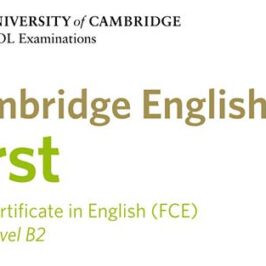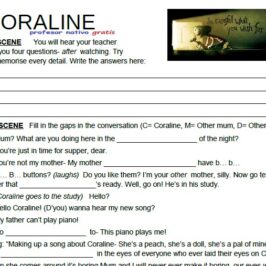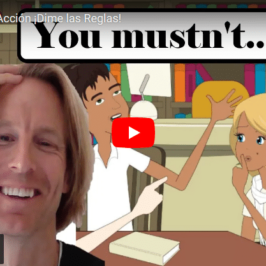Today we’re going to learn how to enrich our essays and avoid repetion. There’s also a pdf. for teachers to use in class. A very simple and effective way of improving your Writing in English is by using synonyms in order to vary your vocabulary. This is equally valid for exams (Cambridge First Certificate, Advanced, Proficiency…), for academic reasons or for work.
The secret ingredient? Synonyms!
You just need to set yourself these rules until they become a habit….
ARE YOU A TEACHER? DOWNLOAD THE PDF. HERE!
1) Don’t use ‘Very’
‘Very’ is a ‘cigarette’ word that only leads you into bad habits. English has a huge (‘very big’) amount of adjectives, so there are hardly any (‘very few’) occasions when it’s essential (‘very important’) to use this word. Substituting ‘very’ with a synonym or an extreme adjective is effortless (‘very easy’).
So let’s start with this exercise.
- Awful = Very ___________
The answer is ‘bad’. Now you try with these:
- Packed = Very __________
- Deafening = Very ________
- Ancient = Very __________
- Fascinating = Very _______
- Exhausted = Very ________
- Excruciating = Very ______
- Flawless = Absolutely _____
- Stunning = Very _________
- Spotless = Very _________
- Filthy = Very ___________
- Petrified = Very _________
- Boiling = Very __________
- Freezing = Very _________
- Brilliant = Very _________
- Furious = Very __________
- Starving = Very _________
- Tiny = Very ____________
And if you really really need to use ‘very’, why don’t you use ‘extremely’? Or ‘unusually’? Or ‘notably’? Or ‘indeed’ (It was cold indeed)?
Answers below!
2) Don’t use ‘Go’
When did you learn the word ‘go’? It was one of the first verbs you learnt in English, and now, ___ years later, you’re still using it!
It’s about time you gave ‘go’ some much-needed holidays and you started to look for other verbs to take its place. I’ve spoken a bit about this in my post about Phrasal Verbs, but now we’ll take it a bit further.
Think about it…when you ‘went’ to the shops, what exactly were you doing? I walked, I drove, I cycled, I ran, I flew…?
Substituting ‘go’ for another word can also show the mood of the subject of the sentence. Have a look at these sentences. How did this person walk into the room?
- CASUALLY
- SECRETIVELY
- ABRUPTLY
- QUICKLY
- CONFIDENTLY
- He wandered into the room.
- He shot into the room.
- He slid into the room.
- He hurried into the room.
- He marched into the room
- He jumped into the room.
- He strolled into the room.
- He burst into the room.
- He sneaked into the room.
- He rushed into the room.
- He crept into the room.
Answers below!
3) Don’t use ‘Say’ or ‘Tell’
‘Say’ and ‘Tell’ are two of the most important and most common verbs in English, and that’s why you end up using them without thinking, missing out on a great opportunity to enrich your writing skills. Again, there are so many ways to suggest something more than just ‘saying’ that it’s a shame not to use them.
By the way, do you have any doubts about the difference between ‘Say’ and ‘Tell’? Click here.
‘Let’s finish this off tomorrow’…. (COMPLETE THE WORDS):
- She w_ _s _ ered to me.
- She s _ _ uted at me.
- She dec _ _ red.
- She _ _ _ ommended.
- She rep _ _ _ d.
- She gr _ _ ned.
- She ins _ _ _ ed.
- She i _ _ _ rmed me.
- She m _ _ _ _ oned.
- She ann _ _ nced.
- She _ _ _ ponded.
- She s _ _ ted.
- She not _ _ _ ed me.
- She mu _ _ ered.
- She rev _ _ _ ed.
- She _ _ serted.
- She a _ _ ed.
- She re _ _ _ ked.
- She e _ _ laimed.
- She su _ _ ested.
- She _ _ _ wered.
- She s _ ghed
Is the list long enough for you? Do I need to give you any more reasons?
4) Use the SECOND word that comes into your head.
You were about to write ‘I saw John in the street’ but STOP! Think a second longer – ‘met’ is equally basic, but how about ‘encountered’? Don’t forget the Phrasal Verbs; ‘bumped into’, ‘came across’…? Although if you want to know some Phrasal Verbs, click here.
Match the synonyms. The answers are below:
|
JUMP |
SELECT |
|
USE |
PONDER |
|
HIDE |
CEASE |
|
FINISH |
SLAY |
|
BREAK |
EMPLOY |
|
HATE |
ASSIST |
|
STOP |
LEAP |
|
LOOK |
SMASH |
|
CHOOSE |
LOATHE |
|
PUT |
WEEP |
|
CRY |
LOCATE |
|
FIND |
PLACE |
|
KILL |
COMPLETE |
|
THINK |
GLANCE |
|
HELP |
CONCEAL |
|
SHOW |
DISPLAY |
|
WATCH |
OBSERVE |
These are examples, of course, but if you get into the habit of using synonyms in your writing, not only do you avoid repetition, but you enhance your writing in a relatively straightforward fashion (very easy way). Remember to Subscribe for more material and free e-books every month.
Do you want more? Read this post: ‘7 Techniques for Better Writing’.
Answers
Part 1
- Packed = Very CROWDED
- Deafening = Very LOUD/NOISY
- Ancient = Very OLD
- Fascinating = Very INTERESTING
- Exhausted = Very TIRED
- Excruciating = Very PAINFUL
- Flawless = Absolutely PERFECT
- Stunning = Very BEAUTIFUL/IMPRESSIVE
- Spotless = Very CLEAN
- Filthy = Very DIRTY
- Petrified = Very SCARED
- Boiling = Very HOT
- Freezing = Very COLD
- Brilliant = Very CLEVER
- Furious = Very ANGRY
- Starving = Very HUNGRY
- Tiny = Very SMALL
Part 2
- He wandered into the room. CASUALLY
- He shot into the room. QUICKLY
- He slid into the room. SECRETIVELY
- He hurried into the room. QUICKLY
- He marched into the room. CONFIDENTLY
- He jumped into the room. ABRUPTLY
- He strolled into the room. CASUALLY
- He burst into the room. ABRUPTLY
- He sneaked into the room. SECRETIVELY
- He rushed into the room. QUICKLY
- He crept into the room. SECRETIVELY
Part 3
- She whispered to me.
- She shouted at me.
- She declared.
- She recommended.
- She replied.
- She informed me.
- She mentioned.
- She announced.
- She responded.
- She stated.
- She notified me.
- She muttered.
- She revealed.
- She asserted.
- She added.
- She remarked.
- She exclaimed.
- She suggested.
- She answered.
Part 4
|
JUMP |
LEAP |
|
USE |
EMPLOY |
|
HIDE |
CONCEAL |
|
FINISH |
COMPLETE |
|
BREAK |
SMASH |
|
HATE |
LOATHE |
|
STOP |
CEASE |
|
LOOK |
GLANCE |
|
CHOOSE |
SELECT |
|
PUT |
PLACE |
|
CRY |
WEEP |
|
FIND |
LOCATE |
|
KILL |
SLAY |
|
THINK |
PONDER |
|
HELP |
ASSIST |
|
SHOW |
DISPLAY |
|
WATCH |
OBSERVE |









